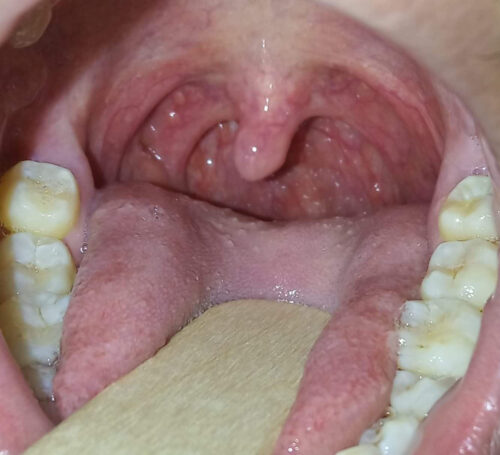Tonsil stones—though relatively unknown to many—are a surprisingly common oral health condition that can lead to discomfort, bad breath, and even recurrent throat infections. Understanding what causes tonsil stones, how to identify them, and what you can do to prevent or treat them is essential to maintaining overall oral hygiene. In this comprehensive guide, we’ll walk you through everything you need to know about tonsil stones and how our commitment to providing complete dental care solutions can help you manage and prevent them effectively.
At Olive Dental Clinic, we believe that great oral health is the foundation of overall well-being and confidence. That’s why we are dedicated to offering holistic and personalized dental care that empowers our patients to feel their best.
What Are Tonsil Stones?
Tonsil stones, also known as tonsilloliths, are small, hard calcified formations that develop in the tonsils. They can appear white or yellowish in color and vary in size from as small as a grain of rice to as large as a grape. These stones form in the crevices of the tonsils—called tonsil crypts—when debris such as dead cells, mucus, food particles, and saliva gets trapped and hardens over time.
While tonsil stones are typically harmless, they can cause uncomfortable symptoms and often lead to embarrassment due to persistent bad breath. In some cases, they can grow large enough to irritate the throat or become infected, necessitating professional treatment.
What Causes Tonsil Stones?
Tonsil stones develop when organic debris accumulates in the folds of the tonsils. This debris provides the perfect breeding ground for bacteria and fungi, which feed on it and contribute to its hardening into stone. Several risk factors can increase the likelihood of developing tonsil stones, including:
1. Poor Oral Hygiene
Inadequate brushing, flossing, and tongue cleaning can lead to increased bacterial activity in the mouth. This not only contributes to tooth decay and gum disease but also creates an ideal environment for the formation of tonsil stones.
2. Large Tonsils
Some people naturally have larger tonsils with deeper crypts that are more prone to trapping food particles and debris.
3. Chronic Sinus Issues
Frequent postnasal drip associated with allergies or chronic sinusitis can increase mucus accumulation in the back of the throat, which may settle in the tonsils and contribute to stone formation.
4. Recurrent Tonsillitis
Inflamed or infected tonsils may be more susceptible to harboring debris and bacteria, especially in people who experience frequent throat infections.
Understanding these contributing factors is the first step in managing the condition. At our clinic, we provide thorough assessments to identify the root causes of tonsil stones and offer personalized care plans for long-term prevention.
How to Identify Tonsil Stones
Tonsil stones can be difficult to detect, especially if they are small and hidden deep within the tonsil tissue. However, some symptoms can help signal their presence:
- Persistent Bad Breath: The sulfur-producing bacteria involved in the formation of tonsil stones can cause a noticeable and unpleasant odor.
- Sore Throat: You may feel a dull ache or irritation on one or both sides of the throat.
- Difficulty Swallowing: Larger stones can obstruct the throat slightly, making swallowing uncomfortable.
- Ear Pain: Though the stones don’t touch the ears, shared nerve pathways can cause referred pain.
- Chronic Cough: A foreign body sensation in the throat can trigger coughing.
- Swollen Tonsils: The area around the stone may become inflamed or swollen.
- Visible White or Yellow Formations: In some cases, stones may be visible at the back of the throat.
Smaller stones might not cause any symptoms and are often discovered incidentally during a dental exam or by the individual when coughing.
How to Prevent Tonsil Stones
Although tonsil stones are generally benign, their recurrence can be bothersome. Preventive care is key. Here are practical tips to help reduce your chances of developing tonsil stones:
1. Maintain Excellent Oral Hygiene
Brush your teeth at least twice daily and floss regularly to eliminate food particles and plaque. Pay particular attention to brushing the back of the tongue, where bacteria often accumulate.
2. Stay Hydrated
Drinking plenty of water helps keep the mouth moist and aids in flushing away debris that can lead to stone formation.
3. Gargle With Salt Water
Rinsing your mouth with warm salt water can help dislodge trapped particles, reduce inflammation, and alter the pH of your mouth to discourage bacterial growth.
4. Avoid Smoking
Smoking contributes to dry mouth and bacterial imbalance, both of which increase the risk of tonsil stones and other oral health issues.
5. Use a Mouthwash
Antibacterial mouthwashes can help control oral bacteria and reduce the chance of debris becoming lodged in the tonsils.
6. Address Allergies and Sinus Issues
Managing postnasal drip through medication or allergy treatment can limit mucus accumulation in the tonsils.
At our dental practice, we are committed to providing comprehensive care that addresses not just your teeth, but your entire oral and throat health. Preventive care is always at the forefront of what we do.
Treatment Options for Tonsil Stones
While tonsil stones often resolve on their own, some individuals may need treatment if the stones become large or cause discomfort. Treatment options range from home remedies to surgical procedures, depending on the severity and recurrence.
1. Saltwater Gargle
Gargling with saltwater is one of the simplest and most effective home remedies. It soothes the throat, helps dislodge small stones, and neutralizes odor.
2. Coughing
Occasionally, a strong or sudden cough may help dislodge a stone from the tonsil.
3. Manual Removal
Although some people try to remove tonsil stones using cotton swabs or picks, this is not generally recommended. The tonsils are delicate and prone to bleeding and infection. If manual removal is attempted, it should be done with extreme care.
4. Water Irrigators
A water flosser or irrigator may be used to gently flush stones from tonsil crypts. However, care must be taken not to damage surrounding tissues.
5. Laser Tonsil Cryptolysis
This outpatient procedure uses a laser to smooth out the tonsil surface and remove crypts where stones form. It is performed under local anesthesia and involves minimal recovery time.
6. Coblation Cryptolysis
Unlike laser treatment, coblation uses radiofrequency energy to remove tonsil crypts without heat. It is considered a gentle alternative and offers similar benefits.
7. Tonsillectomy
Surgical removal of the tonsils is a last-resort option for chronic, severe, or recurrent cases where other treatments fail. While effective, this procedure comes with risks and a longer recovery period.
8. Antibiotics
While antibiotics may temporarily reduce the bacteria involved in tonsil stone formation, they do not treat the underlying cause and are not a long-term solution.
Our dental care philosophy is rooted in offering conservative yet effective treatments. We guide our patients through each available option, helping them make informed decisions about their care.
Potential Complications of Tonsil Stones
Tonsil stones rarely cause serious complications, but larger or infected stones can lead to:
- Tonsillar Abscess: A painful infection where pus collects around the tonsils.
- Chronic Inflammation: Repeated irritation can inflame and damage the tonsillar tissue.
- Infection Spread: In rare cases, an infection may spread to nearby areas of the throat or mouth.
If you notice worsening symptoms or signs of infection such as fever, pus, or significant swelling, it is important to seek medical attention promptly.
Are Tonsil Stones Contagious?
Tonsil stones are not contagious. They are made up of biofilm—a mix of bacteria, fungi, and food debris that naturally exists in the mouth. Biofilms can attach to moist surfaces, such as tonsil crypts, and harden into stones over time.
The same biofilm is responsible for other oral health issues like plaque, cavities, and gum disease. Maintaining a clean and balanced oral environment is your best defense.
Frequently Asked Questions (FAQs)
Do tonsil stones go away on their own?
Yes, small tonsil stones may dissolve or dislodge naturally without intervention. However, maintaining good oral hygiene is essential to prevent recurrence.
Can tonsil stones make you sick?
While small stones typically don’t cause illness, larger or infected ones can lead to sore throat, ear pain, or systemic symptoms if left untreated.
Does everyone get tonsil stones?
Not everyone gets them, but they are quite common. Many people may have them without noticing, especially if they are small and asymptomatic.
When should I see a doctor?
Seek medical attention if tonsil stones are recurrent, painful, or accompanied by swelling, fever, or difficulty swallowing.
How do I clean my tonsils?
Gargling salt water, staying hydrated, and using a gentle oral irrigator can help. Avoid harsh mechanical removal methods unless advised by a professional.
Wrapping Up
Tonsil stones are more common than many people realize, and while they are often harmless, they can still be a source of discomfort and self-consciousness. Prevention and early intervention are key to managing this condition effectively.
We are dedicated to providing comprehensive dental solutions that enhance both your oral health and confidence. From regular cleanings to targeted care for conditions like tonsil stones, we are here to support you with personalized, professional service every step of the way.
If you or a loved one has concerns about tonsil stones or overall oral health, don’t hesitate to reach out. Let’s work together to build a healthier, fresher smile for life.



